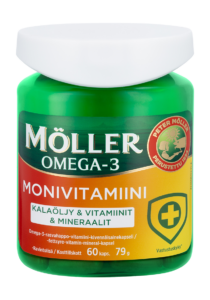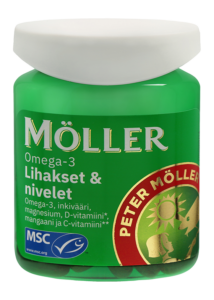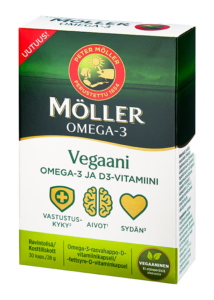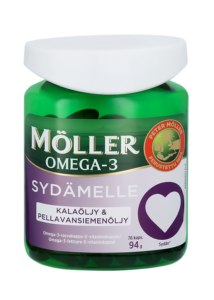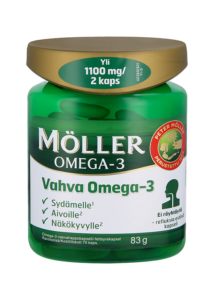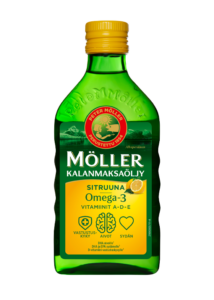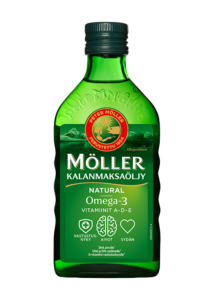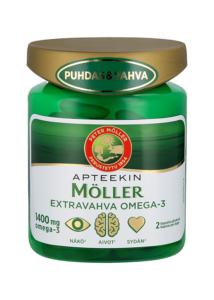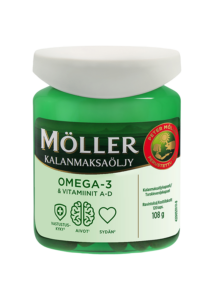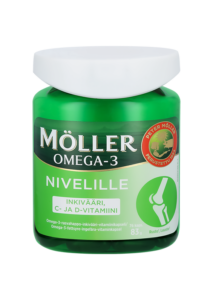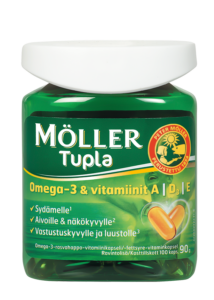Tiesitkö, että jatkuva univaje pitää aivot puoliliekillä ja aiheuttaa kehossa matala-asteista tulehdusta? Molempiin auttaa omega-3-rasvahappojen riittävä saanti.
Home » Palautuvatko aivosi riittävästi yön aikana?

Aivot palautuvat syvän unen aikana
Kun kiire painaa päälle, moni nipistää lisäaikaa ensimmäisenä unesta. Uni tulisi päinvastoin laittaa etusijalle, jos haluaa jaksaa ja voida hyvin, muistuttaa aivotutkija Mona Moisala. Uni vaikuttaa eniten aivojen hyvinvointiin ja sitä kautta niin mielialaan, keskittymiseen, oppimiskykyyn kuin muistiin. Kun nukut hyvin, olet myös parempi äiti, työkaveri ja kumppani. Mikä unesta sitten tekee niin tärkeää aivoille, että se tulisi laittaa tärkeyslistan kärkeen?
Yön aikana aivomme käyvät läpi viisi eri univaihetta: kaksi kevyttä, kaksi syvää ja REM-vaiheen. Näistä tärkeimmät aivojen palautumiselle ovat syvän unen vaiheet ja syvä REM-vaihe.
”REM-unen aikana aivot ovat lähes yhtä aktiiviset kuin hereillä: edellisenä päivänä koetut ja opitut asiat kertautuvat mielessä, siirtyvät pitkäkestoiseen muistiin ja aivoissa rakentuu uusia hermosoluyhteyksiä. Lisäksi lymfaattinen järjestelmä siivoaa aivoista kuona-aineita eli palauttaa aivoja unen aikana” Moisala kertoo. Jos uni on liian kevyttä tai katkonaista, aivot eivät saa palauttavaa syvää unta riittävästi. Myös liian lyhyet unet kostautuvat ennen pitkään. ”Jos nukkuu jatkuvasti tunnin liian vähän, kasaantunut univaje alkaa kuukausien myötä vaikuttaa niin keskittymiseen kuin mielialaan.”
Näin nukut paremmin
Unentarve vaihtelee yksilöllisesti yleensä 7–9 tunnin välillä. Oman luontaisen unen tarpeensa voi testata loman aikana nukkumalla kolme yötä omaan rytmiinsä. Kun oman unitarpeensa on löytänyt, siitä tulisi pitää kiinni. Moisala suosittelee pysymään samassa unirytmissä niin arkena kuin viikonloppuna. Aivoja voi hoitaa myös päiväunilla, hän muistuttaa. Jos ei ole suurta univajetta, 15–20 minuutin tehotorkut virkistävät aivoja iltapäivällä yhtä paljon kuin kupillinen kahvia. Univajeeseen voi taas auttaa puolentoista tunnin päiväunet, koska silloin aivot ehtivät käydä palauttavassa syvässä univaiheessa.
What is good health?
Do you have a good lifestyle?
Lifestyle simply means the way in which you live. Health and lifestyle go hand in hand. You might feel you have a good lifestyle if you are physically active, eat healthily and generally experience a sense of wellbeing. Conversely, if you want good health you should also have a good lifestyle.
Physical activity is the major contributor to a good lifestyle, but diet, drugs, stress, sleep and social conditions are also play an important role. Being able to use the body properly to avoid injury also affects lifestyle. Physical activity can also prevent depression and help you to recover more quickly from mental illness, both of which obviously affect your lifestyle.
Diet can be a difficult topic for many. Perhaps you eat too much or too little or maybe you find it hard to know what foods to combine to have a balanced diet. It’s also important to eat food that contains important vitamins, minerals and dietary fibre, omega-3 and antioxidants. On top of all this, you also need to get enough energy, protein and the correct fatty acids. The requirement for these nutrients changes throughout your life. When you are older you also have different requirements than children and younger adults. Women also have different requirements than men. Pregnant and breastfeeding mothers also have special requirements.
When you get older, you lose muscle mass and your body requires less energy and therefore less food. You may lead a less active life than you did before, which is why you require less food. However, your need for minerals, vitamins and other nutrients remains the same. Of course, there are plenty of healthy and active older people, but when you reach 70 to 80 years of age, it’s easier to become ill, especially during flu season.
Some steps you can take to improve your lifestyle and health are to:
- eat a healthy and varied diet
- stay active
- watch your weight
- avoid too much alcohol and don’t smoke
- get enough sleep
- think positive
- practise good hygiene
What is good quality of life?
The World Health Organisation (WHO) defines quality of life as a state where the individual can realise their potential, cope with normal stressful situations, work in a rewarding and positive way, and be able to contribute to others and society.
Quality of life is a wide and somewhat diffuse concept that includes joy in, and a desire for, life. These are values that are rather felt than measured, which in turn are based on personal environment and choices. Quality of life doesn’t necessarily depend on being healthy or sick. It’s the moments between worries, sorrows, problems and ailments that matter. For example, if you have a chronic illness, a feeling of mastery can be important when talking about quality of life.
To sum up, quality of life is a combination of health, lifestyle, networks and social support. It’s about experiencing joy, meaning in life, satisfaction, security and a sense of belonging, as well as being able to use your strengths. It’s also about feeling interest in life, coping with everyday situations and a being committed to something or someone. If you have good quality of life, you will be able to cope better with the inevitable stressful situations in life.
Tuotteita
-
Möller Omega-3 Monivitamiini
Omega-3-rasvahappo-vitamiini-kivennäisainekapseli vastustuskyvylle. Möller omega-3 monivitamiini kaps 60 kpl sisältää vitamiineja, kivennäisaineita ja kalaperäisiä DHA- ja EPA -rasvahappoja kokonaisena nieltävässä kapselissa. Kapselin sisältämä C- ja D-vitamiini edistävät immuunijärjestelmän normaalia toimintaa. Valmiste on tarkoitettu aikuisille monipuolisen ja tasapainoisen ruokavalion sekä terveiden elintapojen tueksi. Pakkauksessa on 60 kapselia.
-
Möller Omega-3 Lihakset & nivelet
Möller omega-3 valmiste lihaksille ja nivelille. Sisältää omega-3 rasvahappoja, magnesiumia, mangaania, C- ja D-vitamiineja sekä inkivääriä.
-
Möller Vegaani Omega-3 ja D-vitamiini
-
Möller Sydämelle
-
Möller Vahva Omega-3
-
Möller Kalanmaksaöljy Sitruuna
-
Möller Kalanmaksaöljy
-
Apteekin Möller Extravahva
-
Möller Omega-3 Kalanmaksaöljykapseli
-
Möller Nivelille
-
Möller Omega-3 Pikkukalat
-
Möller Tupla

